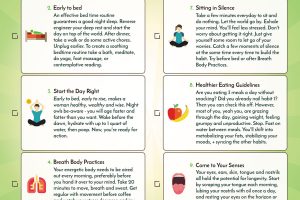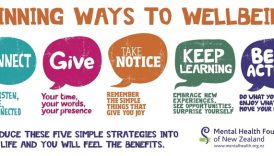10 Habits for a Healthier Lifestyle You Can Start Today

In today’s fast-paced world, maintaining a healthy lifestyle can often feel like a daunting task. However, integrating simple habits into one’s daily routine can make all the difference. Imagine waking up energized, feeling better after nutritious meals, and managing stress effectively. These small shifts can lead to significant improvements in overall well-being.
- 10 Habits for a Healthier Lifestyle You Can Start Today
- The Importance of a Holistic Approach
- Establishing a Routine
- Waking Up Early
- Daily Exercise
- Balanced Nutrition
- Eating Whole Foods
- Drinking Enough Water
- Quality Sleep
- Establishing a Bedtime Routine
- Limiting Screen Time Before Bed
- Stress Management
- Practicing Mindfulness
- Taking Breaks Throughout the Day
- Regular Physical Activity
- Setting Fitness Goals
- Trying Different Workouts
- Social Connections
- Spending Time with Loved Ones
- Joining Community Groups
- Mental Health Awareness
- Seeking Therapy or Counseling
- Prioritizing Self-Care Activities
- Time Management
- Creating To-Do Lists
- Avoiding Multitasking
- Healthy Habits Tracking
- Using Apps or Journals
- Reflecting on Progress
The Importance of a Holistic Approach
Adopting a holistic approach means looking at various aspects of life, including physical health, nutrition, mental health, and social connections. Here are a few core components:
- Establishing a Routine: Consistency is key to physical and mental well-being.
- Balanced Nutrition: Eating right fuels the body and mind.
- Quality Sleep: Rest is not a luxury; it’s a necessity.
- Stress Management: Learning to cope effectively can improve resilience.
By understanding these pillars, individuals can create a roadmap to a healthier, more fulfilling life.
Establishing a Routine
Creating a daily routine is essential for fostering healthier habits. By intentionally structuring each day, individuals can gain control over their lives and make room for positive changes. Two vital components of a well-rounded routine are waking up early and incorporating daily exercise.
Waking Up Early
Waking up early can feel like a challenge, especially if you’re not naturally a morning person. However, consider the benefits:
- Quiet Time: The early hours provide a peaceful atmosphere to reflect or plan for the day.
- Increased Productivity: Studies show that early risers tend to be more productive and achieve their goals more efficiently.
For example, switching from a 7 AM wake-up to a 6 AM wake-up can allow for an extra hour dedicated to engaging activities like reading or meditating.
Daily Exercise
Pairing early rising with daily exercise can amplify the benefits of a structured routine. Incorporating movement into your day has incredible effects:
- Boosts Mood: Exercise releases endorphins, the “feel-good” hormones.
- Improves Energy: Regular physical activity stimulates energy levels, making one feel more awake and alert throughout the day.
Consider establishing a simple workout goal such as a 30-minute walk or a short yoga session each morning. This can set a positive tone for the rest of the day, leading to a more productive and vibrant life.
Balanced Nutrition
After establishing a solid routine with early rising and daily exercise, the next step is to focus on balanced nutrition. What you put into your body plays a crucial role in your overall health and energy levels. Two fundamental aspects of balanced nutrition are eating whole foods and drinking enough water.
Eating Whole Foods
Whole foods—those that are minimally processed—are packed with nutrients that support health and well-being. Incorporating more of these foods into your diet can be simple and rewarding.
- Fresh Fruits and Vegetables: Think vibrant colors on your plate; they signify different vitamins.
- Whole Grains: Opt for brown rice or quinoa instead of white rice for added fiber.
- Lean Proteins: Foods like chicken, fish, and legumes help repair the body and build muscle.
Personal anecdotes reveal the power of whole foods. Many individuals who switch to a whole-food diet report having more energy and feeling lighter.
Drinking Enough Water
Alongside nutritious foods, staying hydrated is vital. Water is the elixir of life!
- Regulates Body Temperature: It helps maintain a stable body temperature, crucial during workouts.
- Aids Digestion: Sufficient intake ensures smooth digestion and nutrient absorption.
It’s often said to aim for eight 8-ounce glasses of water daily, but personal needs may vary. A fun tip: carrying a reusable water bottle can serve as a reminder to drink throughout the day, making hydration a seamless part of your routine.
Quality Sleep
As balanced nutrition plays a fundamental role in health, so too does quality sleep. After ensuring you eat well and stay hydrated, a good night’s rest is essential for your body and mind to recover. Two key strategies for enhancing sleep quality are establishing a bedtime routine and limiting screen time before bed.
Establishing a Bedtime Routine
Creating a calming bedtime routine can signal the body that it’s time to wind down. Here’s how you can design your own:
- Set a Fixed Bedtime: Aim to go to bed and wake up at the same time every day, even on weekends.
- Engage in Relaxing Activities: Consider reading, light stretching, or practicing deep breathing exercises each night.
When I started a consistent bedtime routine, I noticed a remarkable change in my sleep quality. Instead of tossing and turning, I found myself drifting off more quickly and waking up refreshed.
Limiting Screen Time Before Bed
In our digital age, screens can easily disrupt sleep. Blue light emitted by devices can interfere with the production of melatonin—the hormone that regulates sleep. To promote better sleep hygiene, try these tips:
- Set a “Screen Curfew”: Aim to put away phones and computers at least one hour before bed.
- Create a Charging Station Outside the Bedroom: This helps reduce the temptation to check notifications.
By making small adjustments, like establishing a bedtime routine and reducing screen time, one can greatly enhance the quality of sleep and, in turn, overall health.
Stress Management
With quality sleep secured, the next vital aspect to consider is effective stress management. Life can be hectic, but managing stress is essential for maintaining both mental and physical health. Two powerful strategies for coping with stress are practicing mindfulness and taking breaks throughout the day.
Practicing Mindfulness
Mindfulness involves focusing on the present moment and accepting thoughts and feelings without judgment. This practice can reduce stress levels significantly. Here are some ways to incorporate mindfulness into your day:
- Meditation: Start with just five minutes a day, gradually increasing as you become more comfortable.
- Mindful Breathing: Take a few minutes to focus solely on your breath, noticing the sensation as you inhale and exhale.
I personally found that a short daily meditation helped clear my mind, making daily challenges feel more manageable.
Taking Breaks Throughout the Day
Breaks are essential for recharging and reducing stress. Contrary to popular belief, stepping away can enhance productivity. Consider these tips:
- Set a Timer: Try the Pomodoro Technique—work for 25 minutes, then take a 5-minute break.
- Change Your Scenery: Even a quick walk outside can refresh your mind and lift your spirits.
Integrating mindful practices and regular breaks into daily life can significantly alleviate stress and foster a calmer, more focused mindset.
Regular Physical Activity
With effective stress management in place, it’s time to delve into the importance of regular physical activity. Staying active not only boosts physical health but also enhances mental well-being. Two key strategies to make physical activity more enjoyable are setting fitness goals and trying different workouts.
Setting Fitness Goals
Goals give focus and direction to your exercise regime. Here’s how to set effective fitness goals:
- Be Specific: Instead of saying, “I want to get fit,” consider a clearer goal like “I want to run 5k in under 30 minutes within three months.”
- Make Them Measurable: Use metrics like weight lifted, distance run, or workout frequency to track progress.
For instance, when I set a goal to achieve a certain number of push-ups, it motivated me to push harder and stay consistent.
Trying Different Workouts
Variety can make a fitness routine more enjoyable and effective. Incorporating different types of workouts keeps the body challenged and engaged:
- Group Classes: From spinning to yoga, joining a class can make exercising social and fun.
- Outdoor Activities: Hiking, biking, or swimming not only keeps workouts fresh but allows you to connect with nature.
Experimenting with various workouts can turn staying active from a chore into an adventure, ultimately promoting a healthier lifestyle.
Social Connections
Having established the importance of regular physical activity, it’s essential to recognize the role of social connections in promoting a healthy lifestyle. Building strong relationships can contribute to emotional support, which is crucial for overall well-being. Two effective ways to enhance social connections are spending time with loved ones and joining community groups.
Spending Time with Loved Ones
Spending quality time with family and friends can significantly boost mood and reduce stress. Here are some ideas to foster these relationships:
- Plan Regular Gatherings: Setting aside time for family dinners or game nights can create lasting memories.
- Engage in Shared Activities: Try cooking meals together, going for walks, or visiting local attractions.
When I began organizing monthly brunches with friends, I felt a renewed sense of joy that positively impacted my mental health.
Joining Community Groups
Engaging in community groups not only expands your social circle but also enhances your sense of belonging. Consider these options:
- Sports Teams or Clubs: Joining a local running club or recreational sports team introduces you to fitness-minded individuals.
- Volunteering: Giving back to the community fosters connections while contributing to a greater cause.
Exploring these avenues for social connections can lead to fulfilling relationships, promoting overall well-being and happiness in life.
Mental Health Awareness
Having explored the significance of social connections, it’s crucial to highlight the importance of mental health awareness. Just as we prioritize physical health, we must also give attention to our mental well-being. Two effective strategies for enhancing mental health are seeking therapy or counseling and prioritizing self-care activities.
Seeking Therapy or Counseling
Engaging with a trained therapist can provide valuable insights and coping strategies. Here’s why it’s worth considering:
- Safe Space: Therapy offers a confidential environment to express feelings and thoughts without judgment.
- Personal Growth: It can help identify patterns in behavior and provide tools for self-improvement.
From personal experience, seeking counseling during challenging times helped me understand my emotions better, leading to a healthier outlook on life.
Prioritizing Self-Care Activities
Self-care is not a luxury; it’s a necessity. Engaging in self-care activities can greatly enhance mental resilience:
- Engage in Hobbies: Whether painting, gardening, or reading, dedicating time to what you love rejuvenates the mind.
- Mindful Practices: Activities like journaling or yoga help reconnect you with yourself.
Making self-care a priority can significantly boost happiness and overall mental health, leading to a more balanced and fulfilling life.
Time Management
With a solid understanding of mental health awareness in place, it’s now time to dive into effective time management. Managing time well is essential for maintaining a balanced lifestyle and reducing stress. Two powerful strategies to master time management are creating to-do lists and avoiding multitasking.
Creating To-Do Lists
To-do lists serve as an excellent tool for organizing tasks and prioritizing responsibilities. Here’s how to make them effective:
- Break Down Tasks: Instead of listing “clean the house,” try “vacuum the living room,” “dust the shelves,” and “wash the dishes” for clarity.
- Prioritize: Use a simple ranking system to focus on what’s most important each day.
I’ve found that each time I write down my tasks, it brings a sense of accomplishment to strike through completed items, keeping me motivated.
Avoiding Multitasking
Although it may seem productive, multitasking can actually reduce overall efficiency. Here’s why focusing on one task at a time is beneficial:
- Improved Quality: Focusing on a single task often leads to higher quality results.
- Reduced Stress: Juggling multiple things at once can be overwhelming; focusing helps maintain clarity.
By consciously avoiding multitasking and embracing focused work, individuals can not only enhance productivity but also foster a calmer and more organized mindset.
Healthy Habits Tracking
With effective time management strategies underway, it’s crucial to track healthy habits to sustain progress. Monitoring behaviors not only keeps you accountable but also highlights areas for improvement. Two helpful methods for tracking your healthy habits are using apps or journals and reflecting on your progress.
Using Apps or Journals
In our tech-savvy world, there are numerous apps designed to help you track habits easily. Here are some options:
- Habit-Tracking Apps: Apps like Habitica or Loop Habit Tracker allow users to set goals and remind them to follow through.
- Journals: For those who prefer pen and paper, a personal journal can be a reflective space to log daily activities and sustain motivation.
When I started using a habit-tracking app, I noticed an increase in my daily exercise routine just by tracking my progress.
Reflecting on Progress
Periodically reviewing your progress can reveal patterns and motivate further action. Reflecting on your habits can include:
- Weekly Check-Ins: Set aside time each week to review your achievements and any setbacks.
- Adjusting Goals: If you find some goals are no longer meaningful, adjust them to ensure they still align with your vision.
By making it a practice to reflect on your habits and tracking them effectively, you can cultivate lasting, positive changes in your life, reinforcing the commitment to a healthier lifestyle.





